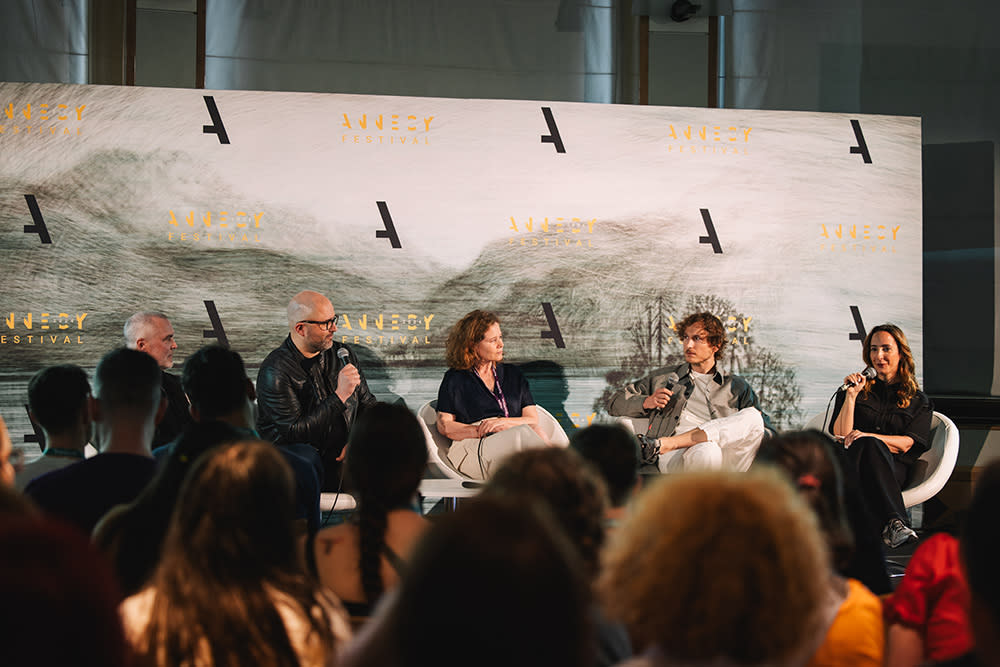‘Transformers One,’ ‘The Smurfs Movie’ Makers on Expanding Franchises: You Have to Show Audiences ‘Something They Don’t Know They Want to See’

When taking on established animated franchises, you can’t just “listen to nostalgia,” according to Jeff Rowe, director of “Teenage Mutant Ninja Turtles: Mutant Mayhem.”
“That’s when things get stale,” he said during Variety’s “Innovation and Inspiration in Global Animation” panel at Annecy Animation Festival, moderated by international editor Elsa Keslassy. Rowe was joined by “Transformers One” director Josh Cooley, “The Smurfs Movie” helmer Chris Miller and María Trénor, the director of “Rock Bottom.”
More from Variety
“It’s important to look at things with fresh eyes and ask, ‘Does this make sense? Does a man who was a sensei turning into a rat make sense?'” Rowe continued. “Our goal was to make a film that those who have never heard of ‘Ninja Turtles’ – or hated it and hated that the movie was even happening – were still able to enjoy.”
Therefore, the team hired many people who had “no familiarity with the franchise.” But it was the opposite when it came to making “Transformers One,” which premiered an unfinished version of the film at Annecy to a standing ovation.
“It’s hard to find someone who doesn’t have any knowledge of it – it has been around for 40 years,” director Cooley said on the panel. “But it’s an origin story and we wanted to make a film my grandmother would understand. She is a huge ‘Transformers’ fan. Massive.”
He added that the “entire crew, myself included, were all fans of the original cartoon. We had producers and execs that worked on all ‘Transformers’ movies. That was extremely helpful to hear what has and hasn’t worked in the past.”
As pointed out by Cooley, the trick is to show the audience “something they are familiar with but also something they don’t know they want to see.”
He continued, “There is so much love for this franchise and most importantly, for these characters. It was all about making sure we did them right.”
Miller, who is working on the prequel “The Smurfs Movie” for Paramount Animation, agreed, “You have to ask yourself, ‘What are the things that everyone knows and loves?’ And you have to respect it and honor it.”
For “The Smurfs Movie,” Miller said the “original comics were our blueprint, also aesthetically, and then you look for opportunities within that. You have the Smurfs village, for example, this mysterious, magical place. You can reinvent it a bit or add to the lore. How did they get there? Why are they there?”
Opening up about other creative challenges, the existing division between animation for children and for adults is “one of the sadder things in the industry,” said Rowe, who signed an exclusive, multi-year first-look development deal with Paramount Animation earlier this year.
“It’s driven by studios and by the business. The wisdom, although it may not be true, is that there are subjects you can’t tackle because it might alienate a certain audience. But it’s my sincere hope is the films we are making will continue to deliver depth and truth.”
He is his own first audience anyway, he admitted. “When I was a kid, I liked stuff that was ‘older’ than me. I was an 8-year-old who wanted to be a 15-year-old, then an 18-year-old who wanted to be 30. Now, I just know I wasted a lot of time wishing I was older,” he said. “It’s important to never dumb down what we do.”
Still, it’s easier to find freedom outside of the mainstream, observed Trénor, who is behind Annecy premiere “Rock Bottom,” a musical film inspired by Robert Wyatt’s album of the same name. The artful film marks the feature debut of the Spanish native, who previously directed the critically acclaimed short films “Con qué la lavaré?” and “¿Dónde estabas tú?”
“It’s an auteur film. It’s for those who like progressive rock and edgy, independent movies. I am lucky because I could be free – I didn’t have to think about the audience at all,” she said.
Diving into a story about “a generation looking for freedom in a country with a dictatorship,” Trénor could also embrace different visual styles.
“It depends on their state of mind. There are moments when they are, how do you put it, stoned. They smoke weed, take acid,” she said. “People hide that fact when they do rotoscope animation and I don’t know – I am proud of it. It makes the whole production process more human.”
Another thing that makes films more human? Humor. “I am very edit-focused and if something’s not funny, we will keep on working on scenes until it plays. We are just trying to make ourselves laugh in the edit, I guess,” said Rowe, who wrote the script for “Teenage Mutant Ninja Turtles: Mutant Mayhem” with Seth Rogen and Evan Goldberg.
“We are constantly looking for laughs,” agreed Miller, praising “Smurfs” writer and “South Park” alum Pam Brady. But, however hard you try, you can never force something to be amusing.
“It just is or it isn’t,” Cooley said. “It’s a mystery to me, still.”
Best of Variety
Sign up for Variety’s Newsletter. For the latest news, follow us on Facebook, Twitter, and Instagram.

 Yahoo News
Yahoo News 
